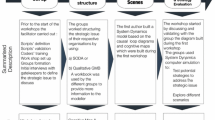Abstract
Attracting clients who are willing to invest in using a problem structuring method (PSM) can be particularly difficult for the emerging generation of modellers. There are many reasons for this, not least that the benefits of a problem structuring intervention are vague and evidence of benefits are often anecdotal for example, claims of constructing a deeper understanding of the problem or building the commitment of a group to implementing an outcome. This paper contributes to the evaluation of problem structuring methods by reflecting on the quid pro quo that a client and problem structuring modeller can enjoy from collaboration. The paper reflects on 21 cases, where Journey Making (a problem structuring method) was used with 16 organizations to help managers agree a suite of actions to tackle a complex strategic issue. The reflections are clustered around those benefits that pertain to: PSMs in general; PSMs that use computer-supported workshops; the Journey Making methodology.
Similar content being viewed by others
References
Ackermann F and Eden C (2001). Stakeholders matter: how can we identify and manage them. In: Ackermann F and de Vreede G-J (eds). Proceedings of Group Decision and Negotiation 2001. Technische Bestuurskunde, Delft University of Technology: Delft.
Ackermann F, Eden C and Williams T (1997). Modelling for litigation: mixing qualitative and quantitative approaches. Interfaces 27(2): 48–65.
Ackoff RL (1979). The future of operational research. Opl Res Quart 30: 361–371.
Anson R, Fellers J, Kelly GG and Bostrom RP (1996). Facilitating research with group support systems. Small Group Res 27: 179–214.
Camacho LM and Paulus PB (1995). The role of social anxiousness in group brainstorming. J Person Soc Psych 68: 1071–1086.
Casu B, Shaw D and Thanassoulis E (in press). Using a group support system to aid input-output identification in DEA. J Opl Res Soc (in press).
Checkland P (1999). Systems Thinking, Systems Practice: Including a 30 Year Retrospective. John Wiley & Sons: Chichester.
Checkland P (2001). Soft systems methodology. In: Rosenhead J and Mingers J (eds). Rational Analysis for a Problematic World Revisited. John Wiley & Sons: Chichester, pp 61–90.
Checkland P and Scholes J (1999). Soft Systems Methodology in Action. John Wiley & Sons: Chichester, UK.
Conklin J (2003). Wicked problems and social complexity. Working paper of the CogNexus Institute. Available at: http://www.gdss.com/index.html.
Connell NAD (2002). Evaluating soft OR: Some reflections on an apparently ‘unsuccessful’ implementation using a SSM-based approach. J Opl Res Soc 52: 150–160.
Cooper WH, Gallupe RB, Pollard S and Cadsby J (1998). Some liberating effects of anonymous electronic brainstorming. Small Group Res 29: 147–178.
Diehl M and Stroebe W (1991). Productivity loss in idea generating groups: tracking down the blocking effect. J Pers Soc Psychol 61(3): 392–403.
Eden C (1985). Perish the thought! J Opl Res Soc 36: 809–819.
Eden C (1988). Cognitive Mapping. Eur J Opl Res 36: 1–13.
Eden C (1992a). A framework for thinking about Group Decision Support Systems (GDSS). Group Decis Negot 1: 199–218.
Eden C (1992b). On the nature of cognitive maps. J Mngt Stud 29: 261–265.
Eden C (1995). On evaluating the performance of ‘wide-band’ GDSS. Eur J Opl Res 81: 302–311.
Eden C and Ackermann F (1998a). Analysing and comparing causal maps. In: Eden C and Spender J-C (eds). Managerial and Organisational Cognition. Sage: London, pp 192–209.
Eden C and Ackermann F (1998b). Making Strategy: The Journey of Strategic Management. Sage: London.
Eden C and Ackermann F (2001). Group decision and negotiation in strategy making. Group Decis Negot 10: 119–140.
Eden C and Jones S (1984). Using repertory grid for problem construction. J Opl Res Soc 35: 779–790.
Edwards JS, Collier PM and Shaw D (2003). Making a journey in knowledge management strategy. J Inform Knowl Mngt 2: 135–152.
Finlay PN (1998). On evaluating the performance of GSS: Furthering the debate. Eur J Opl Res 107: 193–201.
Friend J and Hickling A (1987). Planning Under Pressure: The Strategic Choice Approach. Pergamon Press: London.
Grinyer PH (2000). A cognitive approach to group strategic decision taking: a discussion of evolved practice in the light of received research results. J Opl Res Soc 51: 21–35.
Grise ML and Gallupe RB (1999). Information overload in face-to-face electronic meetings: An integrative complexity approach. J Mngt Inform Syst 16: 157–185.
Hickling A (2001). Gambling with frozen fire? In: Rosenhead J and Mingers J (eds). Rational Analysis for a Problematic World Revisited. John Wiley & Sons: Chichester, pp 151–180.
Janis IL (1982). Groupthink. Houghton Mifflin Company: Boston.
March JG and Olsen JP (1976). Ambiguity and Choice in Organizations. Universitetsforlagat: Bergen, Norway.
Mezias JM, Grinyer P and Guth WD (2001). Changing collective cognition: a process model for strategic change. Long Range Plan 34(1): 71–95.
Mingers J and Gill A (1997). Multimethodology: Theory and Practice of Combining Management Science Methodologies. John Wiley & Sons: Chichester.
Nagasundaram M and Bostrom RP (1995). The structuring of creative processes using GSS: a framework for research. J Mngt Inform Syst 11: 89–116.
Ormerod RJ (2001). Mixing methods in practice. In: Rosenhead J and Mingers J (eds). Rational Analysis for a Problematic World Revisited. John Wiley & Sons: Chichester, pp 311–336.
Phillips L and Phillips M (1993). Facilitated work groups: theory and practice. J Opl Res Soc 44: 533–549.
Pidd M (1996). Tools For Thinking: Modelling in Management Science. John Wiley & Sons Ltd: Chichester.
Pidd M (2004). Systems Modelling: Theory and Practice. John Wiley & Sons Ltd: London.
Rittel HWJ and Webber MM (1973). Dilemmas in a general theory of planning. Policy Sci 4: 155–169.
Rosenhead J and Mingers J (2001). Rational Analysis for a Problematic World Revisited. John Wiley & Sons: Chichester.
Schwarz R (2002). The Skilled Facilitator. Jossey-Bass: San Francisco, CA.
Shaw D (2003a). Evaluating electronic workshops through analysing the ‘brainstormed’ ideas. J Opl Res Soc 54: 692–705.
Shaw D (2003b). Mapping knowledge in groups. In: Edwards JS (ed). Proceedings of Knowledge Management Aston Conference. Operational Research Society: Birmingham, UK, pp 363–374.
Shaw D, Ackermann F and Eden C (2003a). Approaches to sharing knowledge in group problem structuring. J Opl Res Soc 54: 936–948.
Shaw D, Baker B and Edwards JS (2005). Communities of implementation. In: Coakes E and Clarke S (eds). Encyclopedia of Communities of Practice in Information and Knowledge Management. Idea Publishing: London.
Shaw D, Edwards JS, Baker B and Collier PM (2003b). Achieving closure through knowledge management strategy. Elect J Knowl Mngt 1(2): 197–205.
Sutton RI and Hargadon A (1996). Brainstorming groups in context: effectiveness in a product design firm. Admin Sci Quart 41: 685–718.
Taylor D, Berry P and Block C (1958). Does group participation when using brainstorming facilitate or inhibit creative thinking? Admin Sci Quart 3: 23–47.
Westcombe M (2003). Dialog mapping for systems dynamics. Presented at the 13th Bi-Annual Conference of the Young Operational Researcher. Bath, UK.
White L and Taket A (2000). Exploring the use of narrative analysis as an operational research method: a case study in voluntary sector evaluation. J Opl Res Soc 51: 700–711.
Acknowledgements
We thank the anonymous reviewers for their helpful comments.
Author information
Authors and Affiliations
Corresponding author
Rights and permissions
About this article
Cite this article
Shaw, D., Edwards, J. & Collier, P. Quid pro quo: Reflections on the value of problem structuring group workshops. J Oper Res Soc 57, 939–949 (2006). https://doi.org/10.1057/palgrave.jors.2602049
Received:
Accepted:
Published:
Issue Date:
DOI: https://doi.org/10.1057/palgrave.jors.2602049




